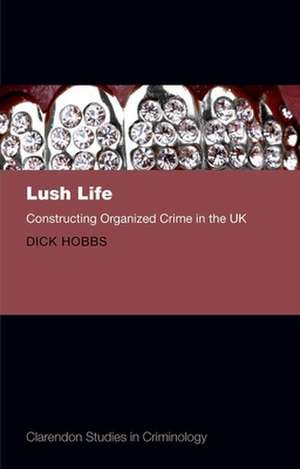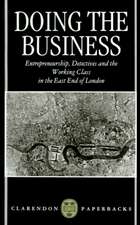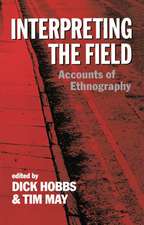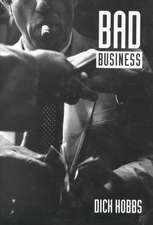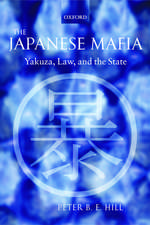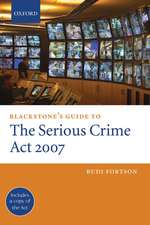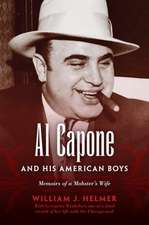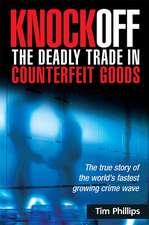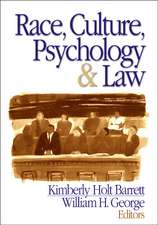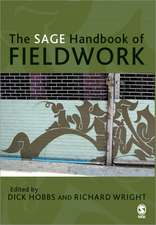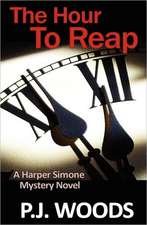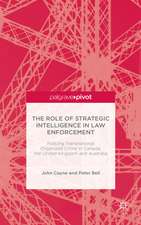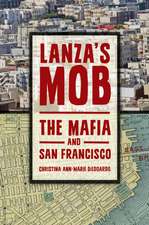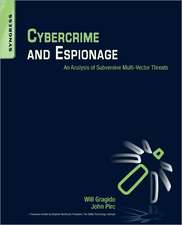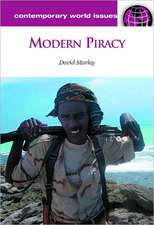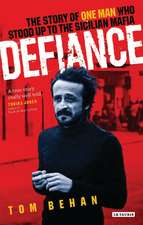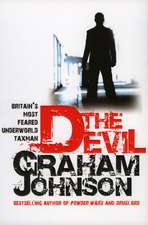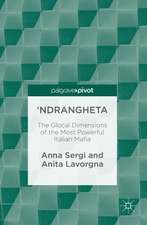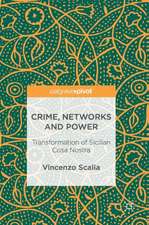Lush Life: Constructing Organized Crime in the UK: Clarendon Studies in Criminology
Autor Dick Hobbsen Limba Engleză Hardback – 10 ian 2013
Din seria Clarendon Studies in Criminology
- 30%
 Preț: 524.88 lei
Preț: 524.88 lei - 27%
 Preț: 539.99 lei
Preț: 539.99 lei - 30%
 Preț: 597.87 lei
Preț: 597.87 lei - 30%
 Preț: 539.03 lei
Preț: 539.03 lei - 30%
 Preț: 540.50 lei
Preț: 540.50 lei - 30%
 Preț: 518.78 lei
Preț: 518.78 lei - 30%
 Preț: 598.35 lei
Preț: 598.35 lei - 30%
 Preț: 521.83 lei
Preț: 521.83 lei - 30%
 Preț: 538.36 lei
Preț: 538.36 lei - 30%
 Preț: 537.95 lei
Preț: 537.95 lei - 30%
 Preț: 539.99 lei
Preț: 539.99 lei - 28%
 Preț: 499.76 lei
Preț: 499.76 lei - 30%
 Preț: 539.57 lei
Preț: 539.57 lei - 27%
 Preț: 500.43 lei
Preț: 500.43 lei - 19%
 Preț: 674.36 lei
Preț: 674.36 lei - 30%
 Preț: 659.34 lei
Preț: 659.34 lei - 30%
 Preț: 838.79 lei
Preț: 838.79 lei - 27%
 Preț: 658.11 lei
Preț: 658.11 lei - 28%
 Preț: 496.73 lei
Preț: 496.73 lei - 25%
 Preț: 561.63 lei
Preț: 561.63 lei - 28%
 Preț: 424.05 lei
Preț: 424.05 lei - 31%
 Preț: 395.73 lei
Preț: 395.73 lei - 34%
 Preț: 579.34 lei
Preț: 579.34 lei - 14%
 Preț: 196.70 lei
Preț: 196.70 lei - 34%
 Preț: 600.54 lei
Preț: 600.54 lei - 30%
 Preț: 521.22 lei
Preț: 521.22 lei - 18%
 Preț: 339.31 lei
Preț: 339.31 lei - 19%
 Preț: 253.88 lei
Preț: 253.88 lei - 15%
 Preț: 395.89 lei
Preț: 395.89 lei - 34%
 Preț: 574.72 lei
Preț: 574.72 lei - 18%
 Preț: 301.83 lei
Preț: 301.83 lei - 34%
 Preț: 560.12 lei
Preț: 560.12 lei - 32%
 Preț: 466.28 lei
Preț: 466.28 lei - 34%
 Preț: 498.34 lei
Preț: 498.34 lei - 34%
 Preț: 522.99 lei
Preț: 522.99 lei - 30%
 Preț: 503.29 lei
Preț: 503.29 lei - 31%
 Preț: 413.86 lei
Preț: 413.86 lei - 34%
 Preț: 629.61 lei
Preț: 629.61 lei - 19%
 Preț: 566.44 lei
Preț: 566.44 lei - 9%
 Preț: 252.66 lei
Preț: 252.66 lei - 13%
 Preț: 167.56 lei
Preț: 167.56 lei - 31%
 Preț: 486.45 lei
Preț: 486.45 lei - 34%
 Preț: 633.17 lei
Preț: 633.17 lei - 30%
 Preț: 538.24 lei
Preț: 538.24 lei - 10%
 Preț: 270.63 lei
Preț: 270.63 lei - 31%
 Preț: 401.95 lei
Preț: 401.95 lei - 28%
 Preț: 473.39 lei
Preț: 473.39 lei
Preț: 486.15 lei
Preț vechi: 672.03 lei
-28% Nou
Puncte Express: 729
Preț estimativ în valută:
93.04€ • 101.02$ • 78.15£
93.04€ • 101.02$ • 78.15£
Carte tipărită la comandă
Livrare economică 11-17 aprilie
Preluare comenzi: 021 569.72.76
Specificații
ISBN-13: 9780199668281
ISBN-10: 0199668280
Pagini: 328
Dimensiuni: 222 x 150 x 23 mm
Greutate: 0.52 kg
Editura: OUP OXFORD
Colecția OUP Oxford
Seria Clarendon Studies in Criminology
Locul publicării:Oxford, United Kingdom
ISBN-10: 0199668280
Pagini: 328
Dimensiuni: 222 x 150 x 23 mm
Greutate: 0.52 kg
Editura: OUP OXFORD
Colecția OUP Oxford
Seria Clarendon Studies in Criminology
Locul publicării:Oxford, United Kingdom
Recenzii
This is an intense, serious, theoretically engaging and timely book whose empirical veracity introduces the reader to a convincing series of interlocking narratives that would do justice to a thriller. The scholarly breadth and ambition of this book alone makes it exceptional
^iLush Life^r is simply an absolute belter of a book, the sort of criminology that really should be read by everyone with an interest in the realities of contemporary crime in Britain. It is another instant classic.
This text is by far the most insightful, accurate and intelligent account of organized or serious crime in the UK in recent times. It should be required reading not just for those of us who are researching aspects of serious crime, but also for those interested in sociology, criminology or the intersection of neoliberal capitalism and social class generally.
The book is not only theoretically original but also empirically so.
Within the literature of organised crime this is undoubtedly an important book. It reminds us that while we may think we know plenty about organised crime, we actually know very little of a world that is all around us and to which we are all, in some way, connected. And finally, the joke that opens the book is almost worth the cover price alone.
Professor Dick Hobbs' new book is a most interesting read and I read it from cover to cover in one sitting. This bookwill be popular, not only with criminal lawyers and criminologists, but with the general public who have had a longstanding fascination with sensational crimes and the criminals who commit these crimesincludes important appendices of the case studies from which the author's conclusions were extracted, which together with an impressive bibliography, makes this an important addition to the criminal law library.
Acutely observed, lucid, funny and always pointed, Dick Hobbs has unpicked the category of organised crime and re-written it as a demystified history of working class life. Lush Life is a classic.
Giving us the central concept cosmopolitan criminal I read Dick Hobbs book in the same breath as a thriller. Lush Life combines in-depth knowledge, thorough analysis, great storytelling and inspiring vision. In short: social science at its cosmopolitan best.
Anyone familiar with Hobbs' works is aware of the wit and artistry of his writing style. In his usual fashion he offers a charming account of a diverse set of entrepreneurs, their zenith and nadir, the fluidity and mutative character of their associations, and the complexity of their actions, criminal career trajectories and motivations. The author is at his best when balancing wonderful narrative mechanics, humorous anecdotes, interesting specifics, punctilious descriptions and the voices of many from the pantheon of his researchs protagonists.
The importance of this book as a contemporaneous ethnographic study of the construction of organized crime should not be underestimated, it ranks among the classical 'top-drawer' empirical studies of criminality.
This is a detailed chronicle of the evolution of working-class entrepreneurial crime in Britain, and it is by turn illuminating, amusing, irreverent and full of pathos. It is a realist analysis that addresses the forms of criminality that are enmeshed in the everyday practice of some of our most marginalized, forgotten and vilified neighbourhoods. I strongly recommend that you read it.
Lush Life [...] could be subtitled How crime is not as neat and tidy as criminologists would like. Hobbs is telling us how he sees it rather than trying to create tidy empirical packages of academic theory. That is what makes Lush Life so interesting and important. It is often witty and always perceptive.
Written in Hobbs' inimitable style, Lush Life draws extensively on invaluable data, which has been a lifetime in the collecting. Warm and engaging, at times oscillating between amusing and bleak, this book is a vital addition to your bookshelf.
In Lush Life Dick Hobbs has given us a book about crime that is more vivid, imaginative and complexly human than even the very best social science fictions.
^iLush Life^r is simply an absolute belter of a book, the sort of criminology that really should be read by everyone with an interest in the realities of contemporary crime in Britain. It is another instant classic.
This text is by far the most insightful, accurate and intelligent account of organized or serious crime in the UK in recent times. It should be required reading not just for those of us who are researching aspects of serious crime, but also for those interested in sociology, criminology or the intersection of neoliberal capitalism and social class generally.
The book is not only theoretically original but also empirically so.
Within the literature of organised crime this is undoubtedly an important book. It reminds us that while we may think we know plenty about organised crime, we actually know very little of a world that is all around us and to which we are all, in some way, connected. And finally, the joke that opens the book is almost worth the cover price alone.
Professor Dick Hobbs' new book is a most interesting read and I read it from cover to cover in one sitting. This bookwill be popular, not only with criminal lawyers and criminologists, but with the general public who have had a longstanding fascination with sensational crimes and the criminals who commit these crimesincludes important appendices of the case studies from which the author's conclusions were extracted, which together with an impressive bibliography, makes this an important addition to the criminal law library.
Acutely observed, lucid, funny and always pointed, Dick Hobbs has unpicked the category of organised crime and re-written it as a demystified history of working class life. Lush Life is a classic.
Giving us the central concept cosmopolitan criminal I read Dick Hobbs book in the same breath as a thriller. Lush Life combines in-depth knowledge, thorough analysis, great storytelling and inspiring vision. In short: social science at its cosmopolitan best.
Anyone familiar with Hobbs' works is aware of the wit and artistry of his writing style. In his usual fashion he offers a charming account of a diverse set of entrepreneurs, their zenith and nadir, the fluidity and mutative character of their associations, and the complexity of their actions, criminal career trajectories and motivations. The author is at his best when balancing wonderful narrative mechanics, humorous anecdotes, interesting specifics, punctilious descriptions and the voices of many from the pantheon of his researchs protagonists.
The importance of this book as a contemporaneous ethnographic study of the construction of organized crime should not be underestimated, it ranks among the classical 'top-drawer' empirical studies of criminality.
This is a detailed chronicle of the evolution of working-class entrepreneurial crime in Britain, and it is by turn illuminating, amusing, irreverent and full of pathos. It is a realist analysis that addresses the forms of criminality that are enmeshed in the everyday practice of some of our most marginalized, forgotten and vilified neighbourhoods. I strongly recommend that you read it.
Lush Life [...] could be subtitled How crime is not as neat and tidy as criminologists would like. Hobbs is telling us how he sees it rather than trying to create tidy empirical packages of academic theory. That is what makes Lush Life so interesting and important. It is often witty and always perceptive.
Written in Hobbs' inimitable style, Lush Life draws extensively on invaluable data, which has been a lifetime in the collecting. Warm and engaging, at times oscillating between amusing and bleak, this book is a vital addition to your bookshelf.
In Lush Life Dick Hobbs has given us a book about crime that is more vivid, imaginative and complexly human than even the very best social science fictions.
Notă biografică
Dick Hobbs is Professor of Sociology and Director of the Criminology Centre at the University of Essex, and Professor of Sociology at the University of Western Sydney. He previously held Chairs at the University of Durham and the London School of Economics. An ethnographer by trade, he is sceptical of the rise of criminology and has published widely on the sociologies of deviance, of East London, organized and professional crime, the night-time economy and the 2012 Olympics. His previous publications include Doing the Business (Oxford, 1988), Bad Business (Oxford, 1995), and Bouncers (Oxford, 2003 with Philip Hadfield, Stuart Lister and Simon Winlow). He is currently working on a number of publications based upon the 2012 London Olympics.
